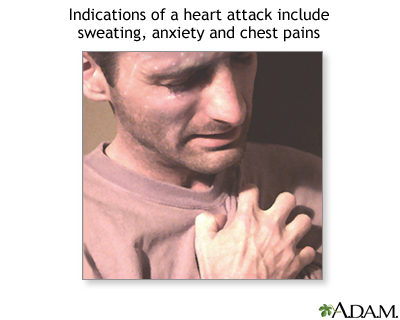Heart Attack First Aid
Heart attack symptoms

Symptoms of a heart attack may be widely varied, from the classic "elephant on the chest" feeling of crushing pain, to the nausea and heartburn mistaken for indigestion. In some patients, the symptoms may only be sudden fatigue or an oppressive feeling of impending death.
Symptoms of heart attack

Symptoms of a heart attack can vary widely and can mimic other conditions such as indigestion or heartburn. The important fact to know is to take all heart attack related symptoms seriously and seek medical help as soon as possible.
A heart attack is a medical emergency. The average person waits 3 hours before seeking help for symptoms of a heart attack. Many heart attack victims die before they reach a hospital. The sooner someone gets to the emergency room, the better the chance of survival. Prompt medical treatment also reduces the amount of damage done to the heart following an attack.
Heart disease is the leading cause of death in America today.
A heart attack occurs when the blood flow that carries oxygen to the heart is blocked. The heart muscle becomes starved for oxygen and begins to die.
Heart attacks can cause a wide range of symptoms, from mild to intense. Women, the elderly, and persons with diabetes are more likely to have subtle or atypical symptoms. Symptoms in adults may include: Women are more likely than men to have symptoms of nausea, vomiting, back or jaw pain, and shortness of breath with chest pain. Babies and children may appear limp and unresponsive and may have bluish-colored skin.
Do Not
Call immediately for emergency medical assistance if
Prevention
Adults should take steps to control heart disease risk factors whenever possible. If you smoke, quit. Smoking more than doubles the chance of developing heart disease. Keep blood pressure, cholesterol, and diabetes in good control and follow with your doctor's orders. Lose weight if obese or overweight. Get regular exercise to improve heart health. (Talk to your doctor before starting any new fitness program.) Limit the amount of alcohol you drink. One drink a day is associated with reducing the rate of heart attacks, but two or more drinks a day can damage the heart and cause other medical problems.
No comments:
Post a Comment